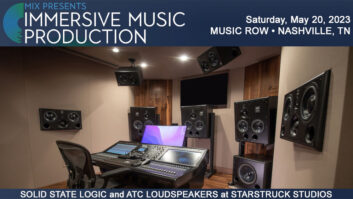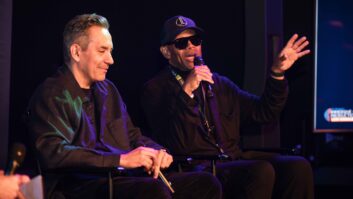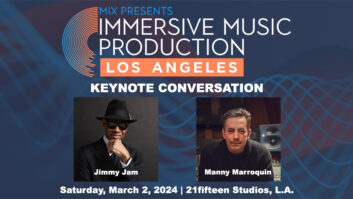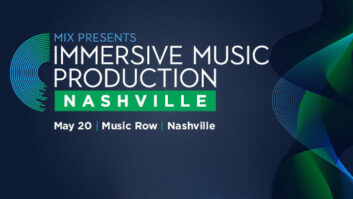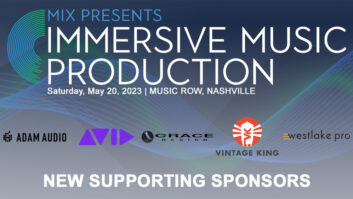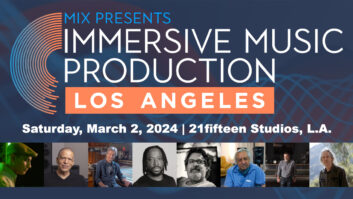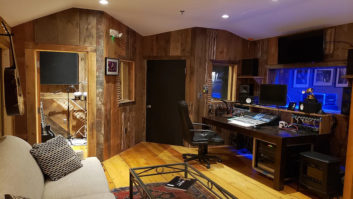
Miles Fulwider (left) and Tricia Walker of Delta Music Institute at Delta State University in Mississippi, with DMI’s newly installed SSL Duality δelta console.
Solid State Logic announces that the Delta Music Institute at Delta State University in Cleveland, Mississippi, has chosen a 48-channel SSL Duality δelta console for its newly upgraded control room.
The Delta Music Institute (DMI) is an independent Center of Excellence within the Delta State University College of Arts and Sciences offering a Bachelor of Science degree in Entertainment Industry Studies. The DMI concentrates on technological, creative, and business areas of the entertainment industries, including specialization in audio. It has a dedicated music studio complex, which includes the large Studio A live room and control room, where the new Duality δelta is installed.
The Director of DMI, Tricia Walker, is herself a Mississippi native and alumna of Delta State University. She returned to the area after spending more than 25 years immersed in the Nashville music scene as a songwriter, performer, producer and publisher. “A lot of our students in this region have not had the opportunity of formal music training,” explains Walker. “So a more classical music education might be quite challenging to them. There is an enormous amount of talent though, so when the DMI began a lot of those students gravitated towards us.”
The courses at the DMI focus on practical skills, but always in the context of the music and entertainment industry. “The music and entertainment industry changes so quickly,” Walker says. “We’re trying to teach our students good solid technical skills and business skills, but also to think and live entrepreneurially in a creative type lifestyle.”
This approach has obviously struck the right note. The DMI has grown significantly over the last six years, and has reached a tipping point. “Our administration has recognized this,” says Walker, “and has decided to run our program up the flag pole. This purchase and some other upgrades put us out there as a flagship program of the university.The SSL represents the icing on the cake, if you will.”
The DMI building used to be a gymnasium, but was then transformed into separate studio spaces, with the centerpiece being a large live room designed by Producer Norbert Putnam.
“It’s rare to have that much space in a university to dedicate to a recording space,” Walker says. “And of course, now with that kind of console in the control room we can really brag that we have the best facilities in the eastern United States.”
Miles Fulwider is the coordinator of Sound Recording Technology for the department, and a full-time instructor on the Entertainment Industry Studies course. “For me,” he says, “In the recording studio, nothing compares to an SSL.”
Fulwider says there were many reasons for selecting the Duality, including flexible routing options, comprehensive analog processing, dual DAW control, and δelta-Control (in-DAW console automation). However, in combination with the console’s SuperAnalogue architecture and I/O, he says the student experience is taken to another level: “These are the tools that allow students to develop fantastic critical listening skills now,” Fulwider explains. “Having to work their way up in the industry for ten years to finally be able to work in a facility that’s got great equipment like this, and only then assess their skills, feels backwards. In this institute they have those tools from the beginning. They have the experience and the skills for them to go out and dive in commercially. Hopefully their careers just explode at that point for them.”
Fulwider says he has found that the console has a profound effect on the way students approach creative projects: “Students coming into our program usually have familiarity with DAWs already. They’ve already used plug-ins and in-the-box processing. However, when they get to touch something physical, and they really understand signal processing, their workflow changes. When they go back and work on their laptops they are listening differently because they have been able to interact with those signals in a different way, versus just watching meters bounce inside of the DAW.”
An important aspect of the new facility is its part in reaching out to the community and bringing the Mississippi Delta’s rich musical and cultural soul to the DMI. This, in turn, fits with the bigger picture—a political drive over recent years to actively develop the creative economy in Mississippi. To this end, the institute will be encouraging professional and community clients to come in and engage with the students both creatively and commercially.
“It’s a win-win for our students because they get to be involved in a professional session, putting into practice things you can’t get out of text book,” explains Walker.
“In late fall of 2015, we were delighted to host Grinder Blues,” adds Fulwider, “a super blues group made of dUg Pinnick [King’s X] and the Bilhman Brothers. It was our first commercial ‘destination recording’ session at DMI using the Duality. The session was a great mix of a professional recording with hands on learning for a select number of students who served as assistant engineers. With the Mississippi Delta being such an historic place for American music, we plan to build on the concept of destination recording at the DMI in order to offer a unique opportunity to recording artists and entertainment industry professionals.”
An additional University and community boost is the arrival of the first ever satellite Grammy museum. Located on the University campus and officially opening on March 5, 2016, the 27,000-square-foot Grammy Museum Mississippi will, according to grammymuseumms.org, “be dedicated to exploring the past, present and future of music, and the cultural context from which it emerges, while casting a focused spotlight on the deep musical roots of Mississippi.”
“It is going to be a huge benefit to not only our campus but to our region and to our state,” says Walker. “Its primary mission is an educational one. One of their main considerations was putting it in a college town that had a fantastic recording program with facilities and equipment to match.”
Find more information about SSL Duality δelta.
Find more information about Delta State University’s Delta Music Institute.
